This is a nutty story. In October I asked my on-site instructor Pedro if he knew anyone who played baseball in Cochabamba; it was almost a joke of a question. But what do you know, Pedro knew a guy named Rodrigo, the founder of the Cochabamba Association of Baseball and Softball. (He once dated Rodrigo’s sister.) By November I was playing, and in March I got a text asking if I’d join the Cochabamba team in the Bolivian national championship 12 hours away in Santa Cruz. This is the story of that tournament.
The afternoon before Good Friday I went to get a buzz cut, said goodbye to my group-mates, and headed for the bus terminal in trufi. I got the last spot on a 106 and crammed into the small van with fourteen other people. Good thing I packed lightly. For the 40-minute ride through rush hour, I sat with my head almost out the window, enjoying the cool, afternoon breeze and the bright yet muted, setting sun. Bolivia was playing Colombia in soccer on the radio, and although background noises and radio fuzz made it hard to understand, I didn’t miss the two screams of GOOOOOOOOOOOOOLLL!!! Bolivia brought it from 2-0 to 2-2 on the ride. I later learned that they lost 3-2 on a stoppage time goal. Not a surprise.
I got to the terminal, the very end of the 106 trufi line, just before six o’clock and met up with several of my teammates. When I travel with my program, we always get tickets in advance, but this time we would take advantage of the cheaper tickets sold by people screaming city names on the terminal floor.
“ORURORURORURORURO!!”
“LAPALAPALAPALAPAZZZ!!”
“SANTACRUZ SANTACRUUUZZ!!”
We were going to Santa Cruz Santa Cruuuzz, so Rodrigo flagged down an appropriate yeller and asked how much the tickets cost.
“How much did I tell you a second ago?” the guy quickly asks.
“Eighty bolivianos.” (It was actually ninety.) “But could you lower it to seventy since there are six of us?”
“Absolutely not,” the guy responds, shaking his head. “Look around, no one’s gonna give you under eighty. Everyone’s saying eighty. It doesn’t matter that you’re six people; nobody’s going under eighty.” Every part of his body moved (except his over-gelled spiked hair) throughout the vehement, offended response to Rodrigo’s offer.
“Seventy five?” Rodrigo countered coolly.
“No, can’t do it.” And he walked away quickly.
No more than three minutes later, the guy came back around the corner and eagerly signed us up for six tickets at seventy bolivianos each ($10).
Our double-decker reclining-seat bus parted at 6:45 PM. As we passed by familiar places in the first few minutes, my thoughts and emotions stirred within me. I was going to play the beautiful game in a very beautiful country. And to think that in six months I would be a normal college student back in the U.S. was unbelievable.
I managed to fall asleep on the bus and didn’t wake up until shortly before our 5:45 AM arrival in Santa Cruz. We walked over to our hotel across the street and crashed for a couple of hours. Santa Cruz is at sea level, way down from Cochabamba at 8500 feet. It’s hot and buggy, rather rich and white, and (at least on Easter weekend) a sorta dead town.
Now I’ll start explaining the baseball stuff. The tournament was the “national club championship,” meaning that instead of each department selecting its best players, their own league championships would decide who advanced to the national tournament. But each department was allowed two “reinforcements” that didn’t have to come from the department-winning team. It seemed like all of the departments found ways to work (or cheat) the system to get their best guys out there. In other words, it felt like a legitimate national championship. I was one of the reinforcements for DSA (the Cochabamba team), and the other was Kazuya, a short, thin, skilled, 24-year-old Japanese catcher who is in Bolivia with an organization that promotes baseball around the world. Actually, Rodrigo was also a reinforcement since he is on a different club team. Shhhh.
The three-day tournament would have seven teams. Games would be seven innings or two hours, whichever came first. Umpires would be members of the other teams, trusted to remain unbiased- which I think they did. Going into the tournament, the home team (Santa Cruz) was the heavy favorite. Santa Cruz vs. the field was about a 50-50 bet. Other than that, San Juan (a community full of Japanese immigrants) was likely the best of the rest, and our team perhaps would be ranked third. We were split randomly into two groups as follows:
Group A
La Paz, Oruro, San Juan, Sucre
Group B
Cochabamba (us), Santa Cruz, Quillacollo
We somehow didn’t have to play on Friday, so we just watched the games and tossed some balls around. One nice moment from that day was throwing my first sea-level slider after 6 months at altitude. The air density matters way more than I thought.
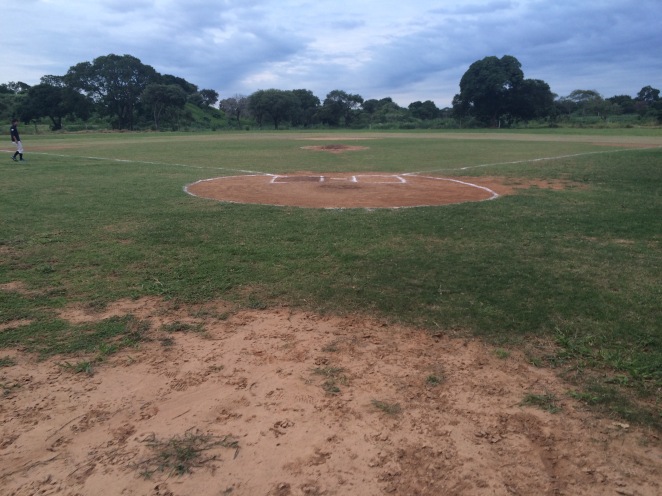
At 9 AM on Saturday, we played the odds-on favorite in Santa Cruz. I was the the starting pitcher. We went through four innings scoreless; I was throwing very well and pitching around some errors. We had two hits and they had one hit through 4. In the fifth inning two errors and two hits got to us. I got pulled out after three unearned runs, and Kazuya came in to finish the game. We lost 5-0 in six innings.
The loss was very frustrating, but of course I was happy with how I pitched. In fact, that performance got me an invite to be on the Bolivian national team for the South American championship in June, which I unfortunately won’t be doing. The problem was that now we’d have to win four straight games (and three in one day) to get the championship. That meant I’d certainly have to pitch again. Playing (let alone pitching) the day after an 80-ish pitch outing is stupid at best and unsafe at worst, but I told myself that with some Tylenol I’d be fine.
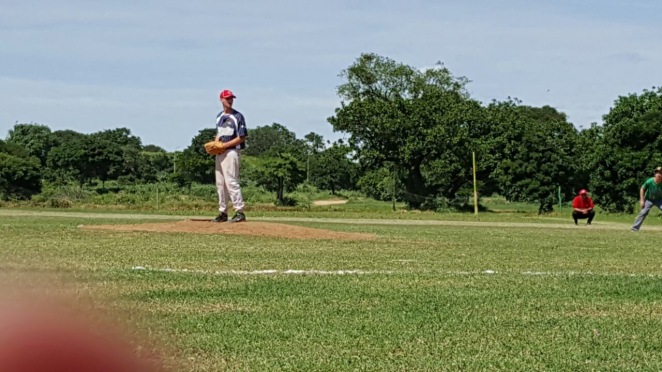
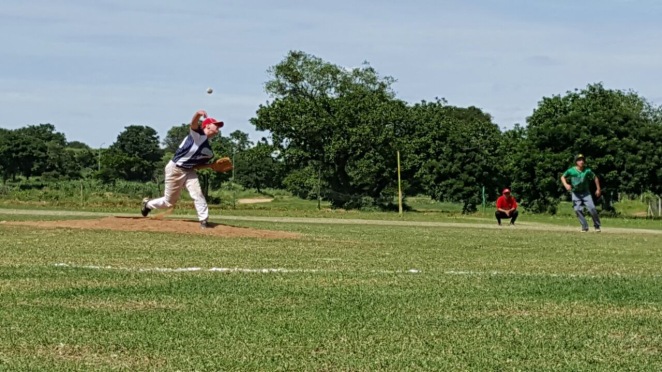
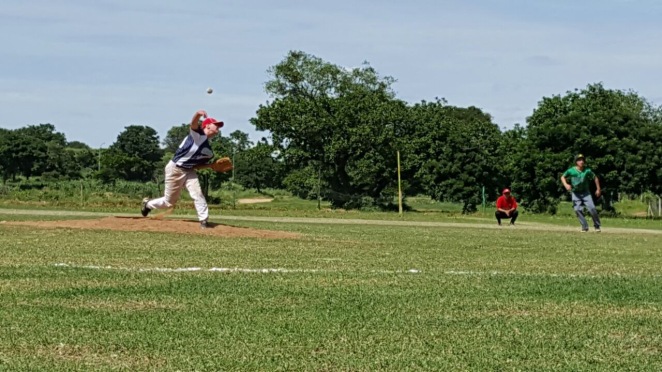
We got lunch at a rotisserie chicken place and then beat Quillacollo 11-1 in a pretty relaxed game. Kazuya pitched the first two innings, and then all of our best players came out.
So the group stage was over:
San Juan 3-0, La Paz 2-1, Sucre 1-2, Oruro 0-3
Santa Cruz 2-0, Cochabamba 1-1, Quillacollo 0-2
We would have to wake up the next day at 5:30 to play Sucre at 7 (semi-final play-in game), then with a win we’d get San Juan at 11, and then with another win we’d probably get Santa Cruz at 2. And Kazuya and I were the only good pitchers. We were in trouble.
The plan was for Kazuya to pitch the first game, me the second game, and both of us the third game. Absurd. We got past Sucre something like 6-1. Kazuya threw very well while I prayed to never have to make a throw from right field.
Then, as we ate hot dogs and salteñas during our two short hours of rest, we got the biggest break of the tournament. La Paz beat Santa Cruz in the first semifinal game. Or to put it more honestly, the two Japanese reinforcements on La Paz’s team beat Santa Cruz. One of them (Daisuke) pitched and held Santa Cruz to one run all game, and as batters they were partially or fully responsible for all three La Paz runs. All of the other teams were rooting hard for La Paz, partially for their own championship prospects and partially because almost everyone in Bolivia who’s not from Santa Cruz hates Santa Cruz.
We finally had a path to winning this championship. But that path would require me throwing to 3-0 San Juan with my arm hurting from the very first warmup pitch. I swear I did not throw a single pitch over 50 mph all game. However, San Juan was surprisingly bad. I located well and threw lots of breaking balls, but any decent JV team back home would’ve lit me up. We won 9-3 in the least energetic national semifinal you could imagine. My right arm didn’t fall off, but it wouldn’t have been that surprising if it did.
Now a 45-minute break before the 9-inning final. The bats were finally getting hot, and we were feeling empowered because Santa Cruz had lost. The pitching matchup would be Daisuke vs. Kazuya. Neither of them had any business being back on the mound. (Oh, did I mention that Kazuya caught every single inning that I pitched?) Walks, hits, and a
Kazuya home run put us up 6-0 by the third. Daisuke had nothing left. Was this really happening?
I had to remind myself that 6 runs wasn’t gonna cut it in this final. It was a war of attrition. Katzuya was going to run out of gas soon, and we had no plan for when that happened. I sure wasn’t pitching again. La Paz (mostly the Japanese guys) started putting up runs, but we answered. 8-3 in the fifth inning. Kazuya was obviously tiring but hadn’t yet hit a wall. In the sixth I passed I him on my way out to right field (where I would stand and keep praying for no action) and told him that he was a samurai. Maybe that was good moral support. 13-7 in the eighth. Kazuya was a tank.
In the seventh inning I had moved to second base because the second baseman’s arm hurt. Imagine that. In the bottom of the ninth inning, I got my moment. Still 13-7, two outs, runners on second and third. Routine grounder to my right, backhand, set, let loose my nervous noodle of an arm to make the throw. It came out fast and low, but the first baseman reached down to his ankles and made the grab. Ball game. Championship. Next thing I knew we were all on the pitcher’s mound singing some fight song in I didn’t know in Spanish, and then we ran around the field with our team’s banner.
Kazuya and I accepted the 1st place trophy at the award ceremony. We took a lot of team pictures, which ended up in the biggest newspaper in Santa Cruz and the two biggest newspapers in Cochabamba. And no more than two hours after accepting the trophy, were on the overnight bus ride that would get us home for work on Monday morning.
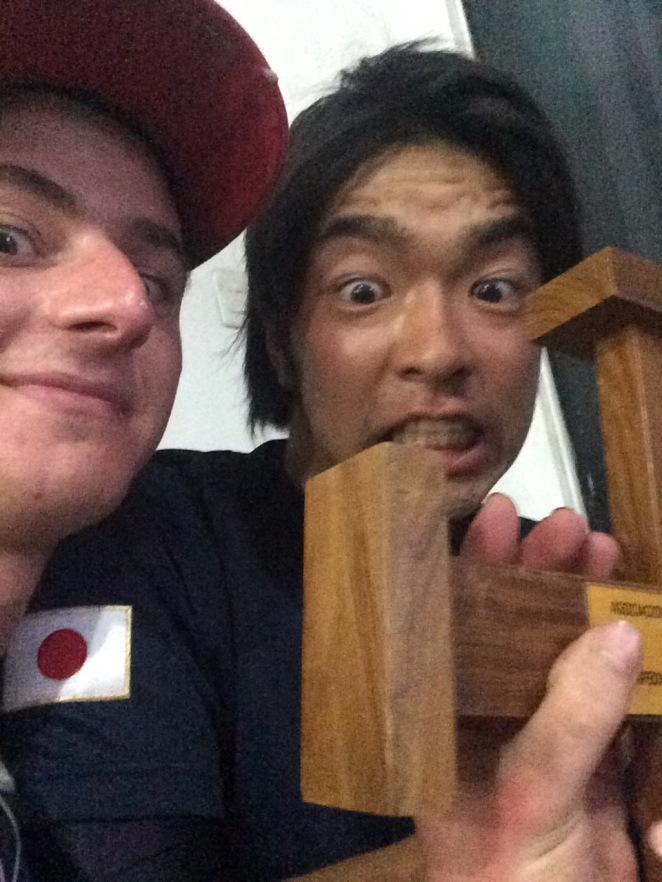 One quick aside: we didn’t eat breakfast the day of the triple-header because we left the hotel before their buffet opened. Nor did we have time for lunch (unless you count the mid-morning hot dogs and salteñas). I am reminded of a famous moment in Philadelphia sports history, when Phillies fans mocked Barry Bonds with an enormous sign in left field saying “Ruth did it on hotdogs and beer… how did you do it?” Well we did it on hotdogs and salteñas.
One quick aside: we didn’t eat breakfast the day of the triple-header because we left the hotel before their buffet opened. Nor did we have time for lunch (unless you count the mid-morning hot dogs and salteñas). I am reminded of a famous moment in Philadelphia sports history, when Phillies fans mocked Barry Bonds with an enormous sign in left field saying “Ruth did it on hotdogs and beer… how did you do it?” Well we did it on hotdogs and salteñas.
So that’s my story. Hope you enjoyed it. I don’t know if I can wrap it up into any concrete takeaways other than that I had the privilege of playing baseball in Bolivia with a 5’6″ robot samurai.
Jacob
P.S. Here are links to a newspaper article about our win: http://www.opinion.com.bo/opinion/articulos/2016/0328/noticias.php?id=186269
P.P.S. I wrote a baseball-heavier, Bolivia-lighter version of this story to send to my former coaches. If you’d like to read it, you can let me know as a comment on this blog or contact me some other way. I’d love to send it on to anyone who’s interested.
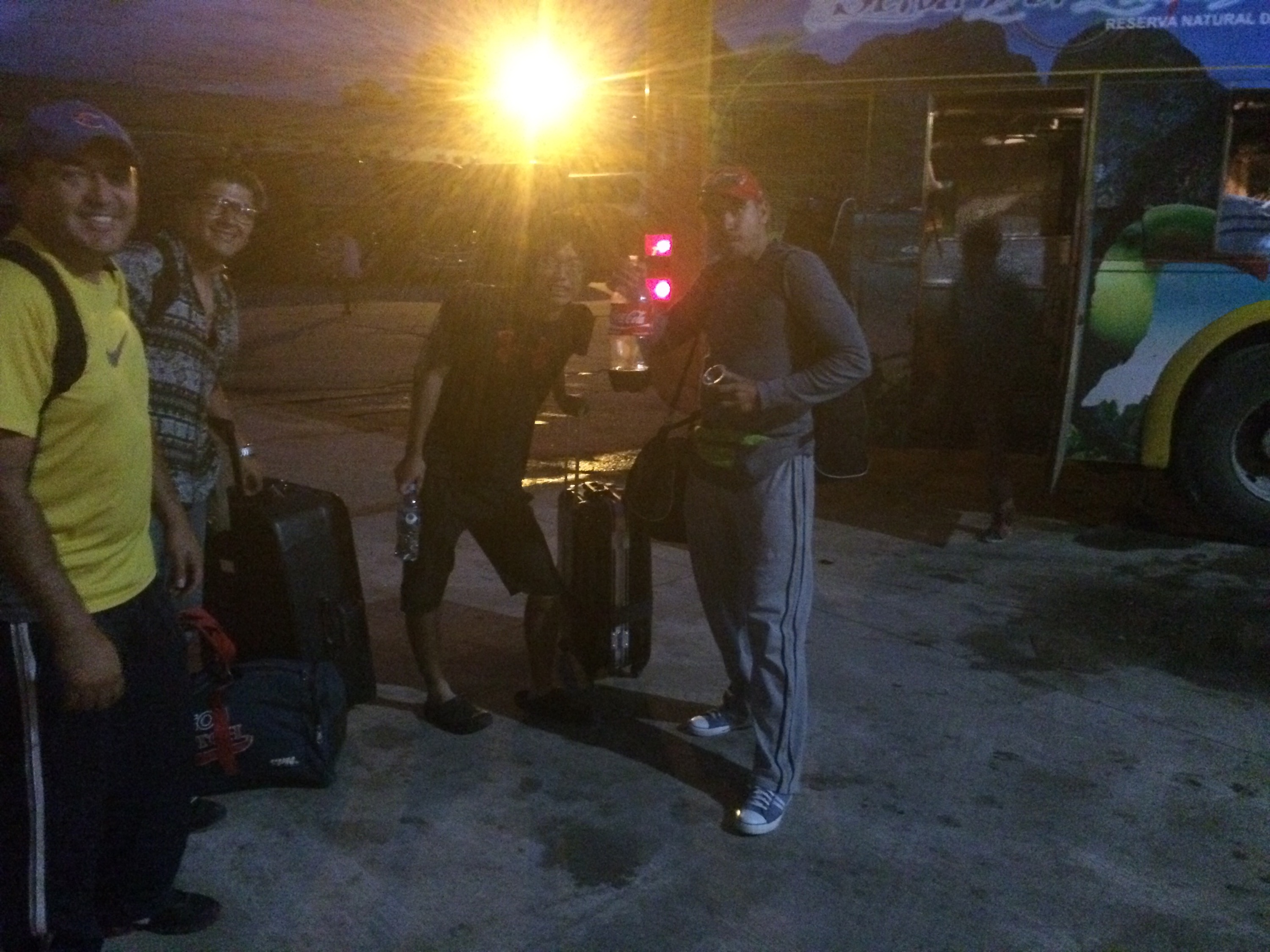
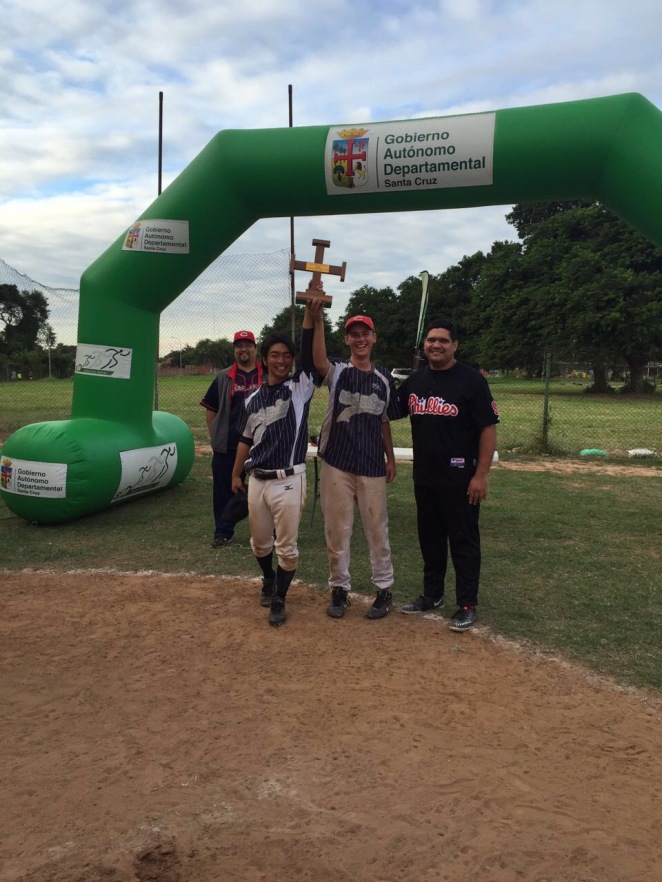
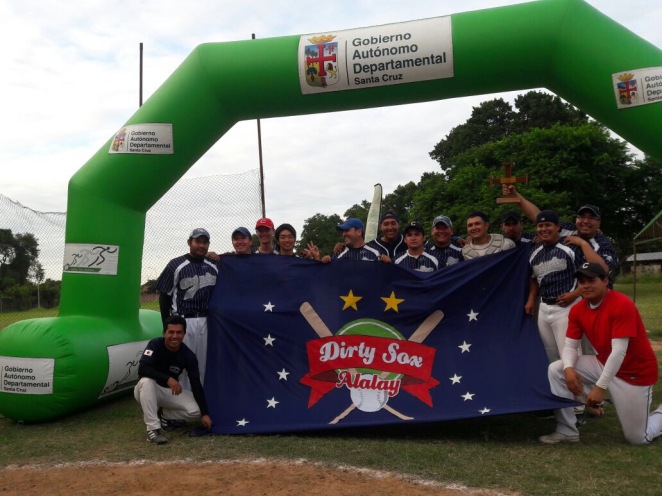
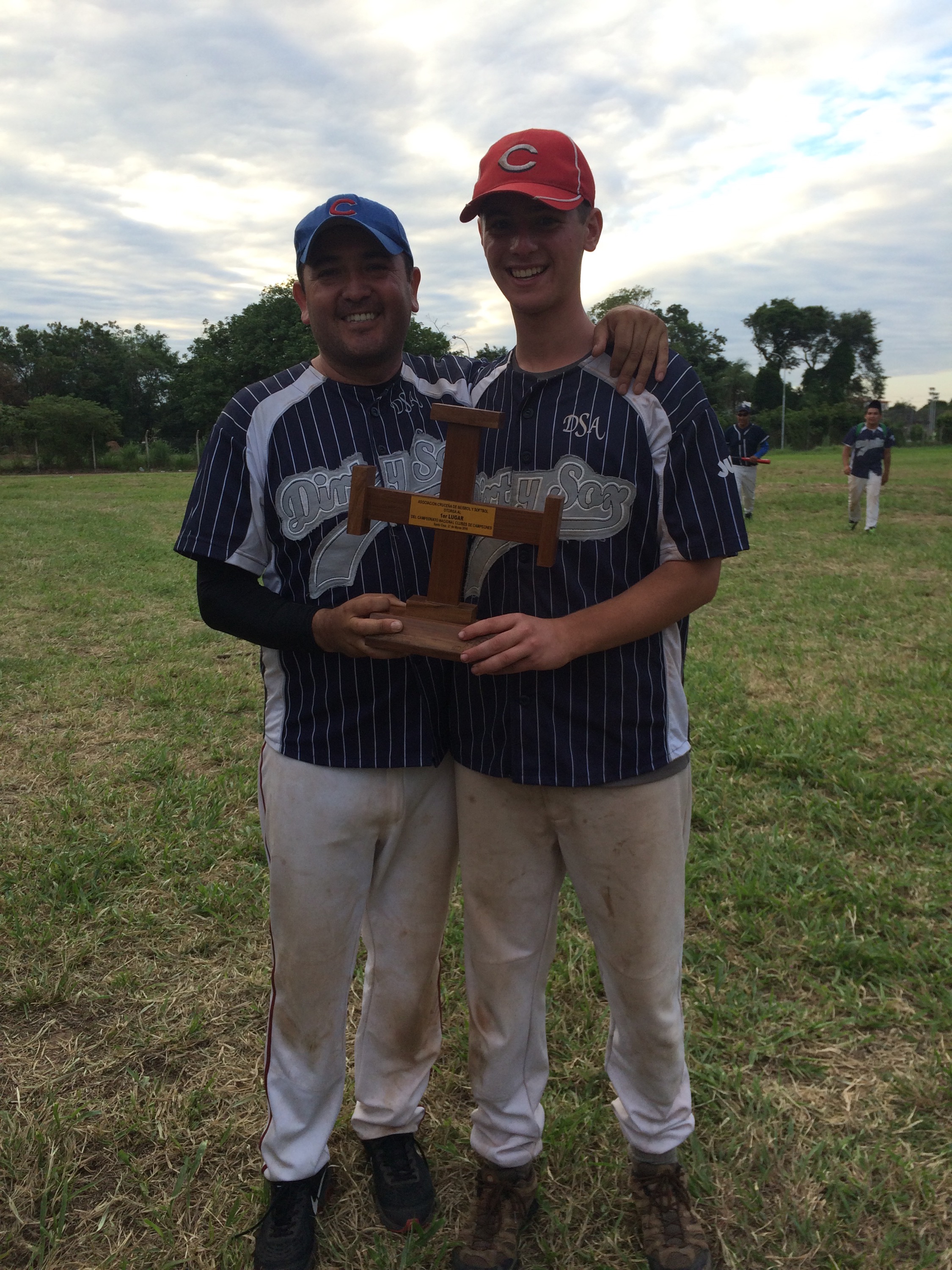
This was great. I laughed several time while reading it.
LikeLike
This is so wild I don’t even know where to start to reply! What an amazing story. I doubt anyone at the Championships said mazel tov, so I’ll say it: MAZEL TOV. The three universal languages: food, music, and sports. The part I like the most about this story is how you wound up finding other baseball players and joining the team. One never knows what small thing will lead to some big thing. Thanks for sharing. Abrazos, Tia Amy
LikeLike
Well done, Coach Jacob! Sebastian is inspired! Did you come up with the Dirty Sox name? (his question, he liked the name) and why are you wearing a Cincinnati cap? I grew up in Cincinnati during the Pete Rose/Johnny Bench era, never thought of you as a fan. Pete Rose played tennis at my parents’ club, and he pretty much soured us on the Reds. Anyway, great story, love that you are making the most of your time in Bolivia!
LikeLike
Hi Aunt Julie! I didn’t some up with the Dirty Sox name, but I think it’s cool and funny that it’s in English. The Reds hat is what they gave me. Everyone has different hats. Could be C for Cochabamba.
LikeLike